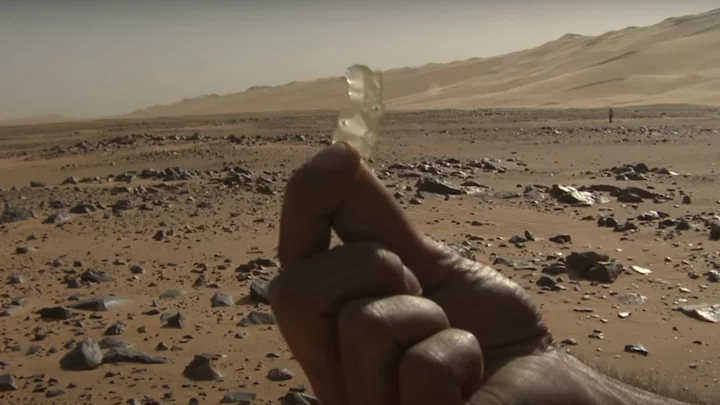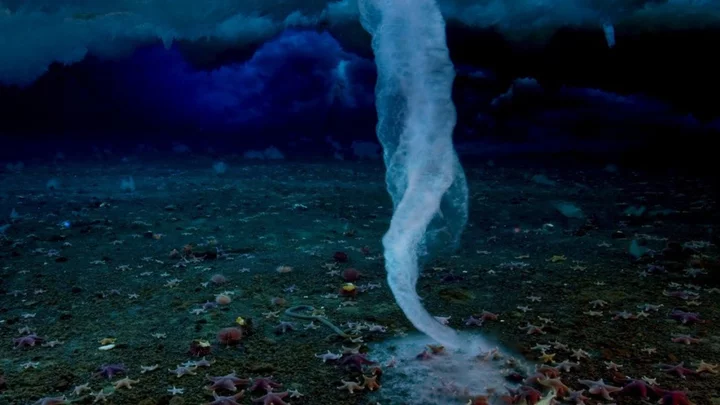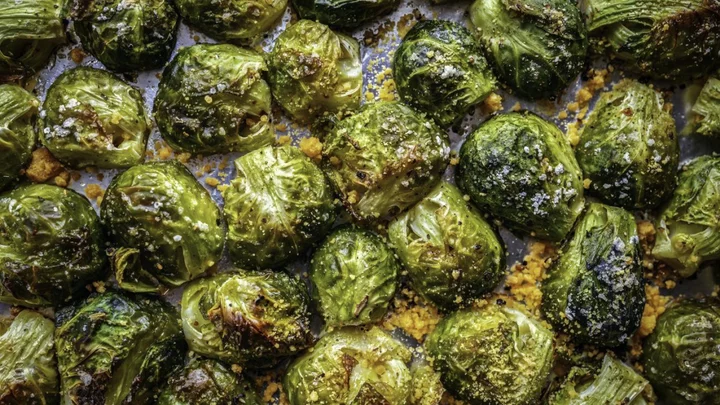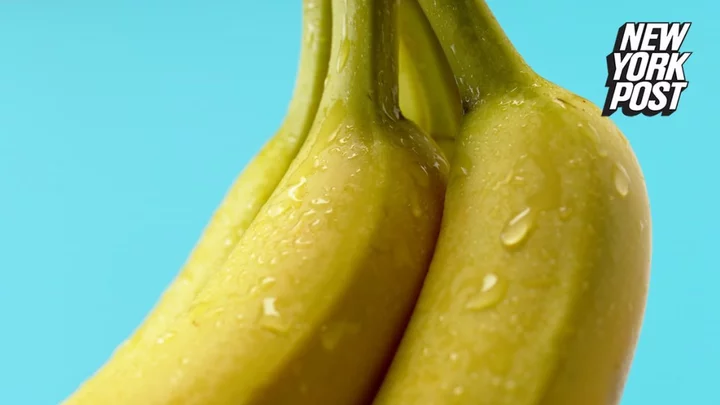
How to Watch The Esports Awards 2023
Players can watch The Esports Awards 2023 live via YouTube or Twitch.
2023-12-01 02:24

Best Audio Settings for Fortnite OG
Check out the best audio settings for Fortnite OG, including how to turn on visual sound effects, to dominate both Battle Royale and Zero Build.
2023-12-01 02:19

Mysterious yellow glass found in Libyan desert 'caused by meteorite', say scientists
A meteorite which smashed into earth 29m years ago may be behind a strange yellow glass found in a certain part of the desert in southeast Libya and southwestern Egypt, according to researchers. The Great Sand Sea Desert stretches over about 72,000 square kilometres across the two countries, and is the only place where the mysterious yellow material is found on Earth. Researchers first described it in a 1933 scientific paper, calling it Libyan desert glass. Mineral collectors have long valued it for its beauty and mysterious qualities – and it was even found in a pendant in Egyptian pharaoh Tutankhamun’s tomb. The origin of the glass has been a mystery for centuries, but researchers writing in the journal De Gruyter used new advanced microscopy technology to get answers. Elizaveta Kovaleva, a lecturer at the University of the Western Cape, wrote that the glass was caused by “the impact of a meteorite on the Earth's surface”. Writing in The Conversation, she said: “Space collisions are a primary process in the solar system, as planets and their natural satellites accreted via the asteroids and planet embryos (also called planetesimals) colliding with each other. These impacts helped our planet to assemble, too.” She said: “We studied the samples with a state-of-the-art transmission electron microscopy technique, which allows us to see tiny particles of material – 20,000 times smaller than the thickness of a paper sheet. “Using this super-high magnification technique, we found small minerals in this glass: different types of zirconium oxide (ZrO₂).” One of the types of this mineral found in the glass can only form at temperatures between 2,250 celsius and 2,700 celsius. Toasty. Kovaleva said: “Such conditions can only be obtained in the Earth's crust by a meteorite impact or the explosion of an atomic bomb.” However, she wrote, there are just as many questions as there are answers. The nearest known meteorite craters are too far away and too small to be the cause of that much glass all concentrated in one part of the world. “So, while we've solved part of the mystery, more questions remain. Where is the parental crater? How big is it – and where is it? Could it have been eroded, deformed or covered by sand?” Safe to say, the scientists will keep on looking until they have the answers. How to join the indy100's free WhatsApp channel Sign up to our free indy100 weekly newsletter Have your say in our news democracy. Click the upvote icon at the top of the page to help raise this article through the indy100 rankings.
2023-12-01 02:17

Apex Legends Players Want More "Wacky Stupid Modes"
After Apex Legends players called for more "wacky stupid modes" like Three Strikes, Respawn Entertainment announced Revenant Uprising, a new 30v30 LTM.
2023-12-01 02:16

Terrifying 'ice finger of death' killing everything it touches caught on camera
Life forms surviving under sea ice have it pretty tough at the best of times, but they face a threat rarely caught on camera which is as terrifying as anything on the planet. BBC crew captured a brinicle on film for the first time for the BBC series Frozen Planet in 2011 and the natural feature resembling a deathly ice finger is the stuff of nightmares. A brinicle forms under sheets of sea ice, pushing downwards and posing existential risks to life forms on the ocean floor. As shown in footage captured for BBC Earth Unplugged, the natural formations can trap creatures and prove deadly – but how do they form? Well, salty water surrounding sea ice can form channels and inlets within blocks of ice. Ice then protrudes through the salty water and heads downwards as the salty water is heavier than the water around it. The salt water also freezes at a lower temperature to the water around it, meaning that it freezes everything it touches as it descends. Safe to say, if you see one of these heading towards you, you’d better start praying. It comes after it was discovered that the world’s biggest iceberg is drifting away from the Antarctic after having been grounded there for more than 30 years. The iceberg, which has the catchy name A23a, split from the Antarctic’s giant Filchner Ice Shelf in 1986, but has been stuck to the ocean floor since shortly after that time. Now, according to the British Antarctic Survey, it is on the move. Sign up for our free Indy100 weekly newsletter How to join the indy100's free WhatsApp channel Have your say in our news democracy. Click the upvote icon at the top of the page to help raise this article through the indy100 rankings
2023-12-01 01:52

There is a scientific reason some people can't stand Brussels sprouts
Christmas is approaching, and that means so are the overcooked, bitter, totally unnecessarily mountains of Brussels sprouts that your family insists on serving. Every, damn, time. Well, that’s how some people might see it, anyway. The fact is, love them or hate them, Brussels sprouts are always going to be controversial – a little like that awkward uncle who rocks up every Christmas and starts a big family row. But it turns out that sprout-haters have actually got a very sound, scientific excuse for their picky eating on Christmas day – and it's all to do with genetics. Stacey Lockyer, nutrition scientist at the British Nutrition Foundation, told Huffpost: “Brussels sprouts are one of a group of vegetables known as cruciferous vegetables or Brassica which also includes broccoli, cabbage, cauliflower and kale. “Brassica contain high amounts of compounds called glucosinolates which, when metabolised in the body, give them their characteristic sharp or bitter taste.” An area covering 3,240 football pitches is dedicated to growing Brussels sprouts in the UK. If you were to line them up individually, they'd stretch from London to Sydney. Despite this, some people are just genetically predisposed to hate that bitter taste. Lockyer added: “Whether we like or dislike certain foods is determined by different factors (such as previous experiences with a food and number of exposures), but some studies have demonstrated that the perception of bitterness of cruciferous vegetables is linked to genetic differences in taste receptors on the tongue.” In fact, a 2011 study by Cornwall College found sprouts contain a chemical which only tastes bitter to people who have a variation of a certain gene. The research found that around 50 percent of the world’s population have a mutation on this gene. About half of us just don’t taste the bitterness usually associated with sprouts, and therefore actually like them. (Imagine!) Nonetheless, hope is not lost. A University of Warwick study found that as we get older, we’re more likely to like sprouts. Research fellow Lauren Chappell said in a blog post: "Sulphur is responsible for the bitter sprout taste. As we age, we lose tastebuds, which can make them more palatable—potentially why adults who hated sprouts as children now embrace them in seasonal dishes.” Which means, regrettably, that your grandparents were probably right all along. How to join the indy100's free WhatsApp channel Sign up to our free indy100 weekly newsletter Have your say in our news democracy. Click the upvote icon at the top of the page to help raise this article through the indy100 rankings.
2023-12-01 01:17

There's a reason why we've never found fire anywhere other than on Earth
Fire might seem like one of the most elemental things in the natural world, but it’s never been found anywhere other than Earth. It’s because the creation of fire relies on very specific circumstances. In fact, if fire was ever found on another planet, it would be a good indicator of the possible existence of life. Oxygen is key to fire, and while it’s particularly prevalent in the universe, Earth’s atmosphere features an abundance of the element in the right molecular form for it to form. Even then, the way the Earth’s atmosphere has changed over its lifespan is also crucial to conditions being fostered where fire can form [via IFLScience]. For millions of years, in fact, there wasn’t enough oxygen in the atmosphere to create fire. Before the Middle Ordovician period, when there was far less oxygen, there’s no evidence of fire whatsoever. Most of the fuel that fire needs is also directly related to life existing on the planet – think wood, oil and coal. Without life, there isn’t an awful lot of fuel going around, which just shows why the existence of fire on another planet would be a very promising sign when it comes to exploring the universe for life. Despite fire being much rarer in the universe than most might think, it was previously confirmed that humans in Europe may have mastered fire long before we previously thought. According to a study published in Scientific Reports, humans made the discovery around 245,000 years ago, up to 50,000 years earlier than scientists believed, Researchers studied samples from the Valdocarros II, a huge archaeological site found east of Madrid, Spain. Using chemical analysis, they found certain compounds that show things were burnt by fire in "organised" social events, rather than through accidents or wildfires. Sign up for our free Indy100 weekly newsletter How to join the indy100's free WhatsApp channel Have your say in our news democracy. Click the upvote icon at the top of the page to help raise this article through the indy100 rankings
2023-12-01 00:57

Using banana skins as an ingredient has unexpected benefits
A study last year found that every time you throw away a banana peel, you're missing out on a great snack. The study, published in ACS Food Science & Technology, found that if banana peels are blanched, dried, and ground into a flour, they can be turned into baked goods that taste just as good as wheat-based products. And it turns out it's actually really food for you. Consuming products made from banana peel means you consume minerals and cancer-fighting minerals. Sugar cookies that were enriched with banana peels not only tasted the same as peel-free sugar cookies, but contained much more fibre, magnesium, potassium, and antioxidant compounds. In 2021, a study on banana peel cake found the yellow skin of the fruit provided a natural food colour as well as a nutritional boost. Whilst a 2016 study found that substituting up to 10 per cent of wheat flower with banana peel flour can enrich baked bread with higher protein, carbohydrate, and fat contents. Not only is it a healthy food option, it also helps reduce food waste! And the same goes for other fruits too, such a mango skin, what was found to boost a cake's antioxidant properties and improve its flavour. Just make sure to add the right amount of banana peel to your bakes and makes. Adding too much banana peel flour did result in the study's cookies going somewhat brown and hard, possibly from all the extra fibre. 7.5 percent of banana peel flour seems to be the sweet spot, with the texture and taste hitting an appealing balance. So maybe reconsider next time you go to thrown a banana skin away. Sign up to our free Indy100 weekly newsletter Have your say in our news democracy. Click the upvote icon at the top of the page to help raise this article through the indy100 rankings. How to join the indy100's free WhatsApp channel
2023-12-01 00:55

Analysts predict more brands will flee X after Musk tirade
By Chavi Mehta and Jaspreet Singh (Reuters) -More advertisers are likely to flee Elon Musk's social-media company X after the
2023-12-01 00:54

How to Turn on Fortnite Aim Assist
To turn on Fortnite aim assist, players must set aim assist strength to 100% in the settings menu under the controller tab.
2023-11-30 23:57

The best right-backs to sign on Football Manager 2024
The best right-backs to sign on Football Manager 2024, including Takehiro Tomiyasu, Arnau Martinez, Emerson Royal, Joe Gomez & more.
2023-11-30 23:55

LoLdle Answers Nov. 30: Classic, Quote, Ability, Splash, Emoji
LoLdle answers for Nov. 30 across all formats including Classic, Quote, Ability, Splash and Emoji.
2023-11-30 23:51
